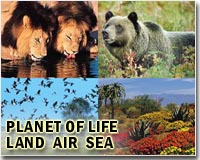| . |  |
. |
Manila (AFP) Oct 20, 2010 The global economy must be radically altered to put a value on forests, reefs and other elements of nature but the financial benefits of doing so will be enormous, a UN-backed report said Wednesday. The Economics of Ecosystems and Biodiversity (TEEB) report warned that allowing nature to remain unaccounted for within the economy would lead to the continuing rapid extinction of species, and ensuing massive financial costs. "TEEB's approach can reset the economic compass and herald a new era in which the value of nature's services is made visible and becomes an explicit part of policy and business decision making," said banker Pavan Sukhdev, who chaired a study that led to the report. After nearly three years of research, the report aims to raise global awareness about the economic costs of inaction on biodiversity in a similar way to British economist Nicholas Stern's famous 2006 report on climate change. The TEEB report was released in Nagoya, Japan, where delegates from 193 countries are meeting at a UN summit in an effort to map out a strategy to stop humans from driving species to extinction. "We hope the next phase after Nagoya... is going to be a change in policy, a change in the matrix, a change in consumer behaviour, a change in business behaviour," Sukhdev told AFP ahead of the report's release. The report highlighted the broad scope of so-called "ecosystem services" that are generally not valued in the economy. These included regulation of the environment -- such as through water filtration by wetlands, pollination and disaster protection -- and as a source of medicines and wild foods. Spiritual and recreational values, as well as the environment's role in nutrient recycling and photosynthesis, also needed to be taken into account, the report urged. TEEB recommended that businesses and governments reveal in annual reports or national accounts how they depleted or damaged the environment. This depletion or damage would have an economic value, and businesses would need to compensate for their adverse environmental impacts. The TEEB reported cited a study by Britain-based consultancy TruCost that found the negative environmental impacts of the world's top 3,000 listed companies were worth 2.2 trillion dollars annually. But it insisted there were already many examples of how placing a value on natural services would bring economic windfalls. It highlighted a decision by New York City to pay landowners in the nearby Catskill mountains between 1-1.5 billion dollars to improve farm management techniques and stop run-off of pollutants. This saved the city from having to build a new water filtration plant, which would have cost 6-8 billion dollars. It also said fishermen around the world could reap an extra 50 billion dollars a year annually if the current over-exploitation of fish stocks, caused partly by billions of dollars in government subsidies, ended. The TEEB report said the impacts of not giving economic values to ecosystems was most widely felt in the developing world. This could be commonly seen when forests were logged, with the economic value placed only on the trees and not the other immense benefits that the ecosystem provided. Among the benefits are that forests act as water catchments, provide habitats for valuable plants and animals, and store carbon so that it is not released into the atmosphere. Continuing to log forests at current rates until 2050 would lead to natural capital losses of 2-4.5 trillion dollars annually, according to TEEB. Sukhdev told AFP that India, Brazil and some other developing countries had already committed to placing values on their natural capital. "I'm delighted to see the leadership is coming from the developing world, and now it's up to the developed world to walk the talk," he said. But Sukhdev warned governments and corporations would not make the enormous changes needed unless pressured to do so by people around the world. "People have to get agitated enough to force their governments to act," he said.
Share This Article With Planet Earth
Related Links Darwin Today At TerraDaily.com
 UN calls for immediate action to save life on Earth
UN calls for immediate action to save life on EarthTokyo (AFP) Oct 18, 2010 The world must act immediately to stop the rapid loss of animal and plant species that allow humans to exist, the United Nations warned on Monday at the start of a major summit on biodiversity. Delegates from the 193 members of the UN's Convention on Biological Diversity (CBD) are gathering in the central city of Nagoya to try to work out strategies to reverse a man-made mass extinction. ... read more |
|
| The content herein, unless otherwise known to be public domain, are Copyright 1995-2010 - SpaceDaily. AFP and UPI Wire Stories are copyright Agence France-Presse and United Press International. ESA Portal Reports are copyright European Space Agency. All NASA sourced material is public domain. Additional copyrights may apply in whole or part to other bona fide parties. Advertising does not imply endorsement,agreement or approval of any opinions, statements or information provided by SpaceDaily on any Web page published or hosted by SpaceDaily. Privacy Statement |